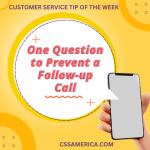
Each one of us talks to co-workers and customers every day. And when you’re speaking with someone, there are always good ways to respond to questions or issues. But there are also better ways to respond. Since you’re receiving weekly customer service tips, I know you are all about continuous improvement!!
So, here are four quick examples of how to go beyond saying words that simply fit the conversation, and – instead – find better ways and better phrases to improve the customer experience.
Because CSS conducts research for our clients, oftentimes we’ll get e-mails from their customers that include complaints, and we need to respond to the customer on behalf of the client even though we have no ability or authority to investigate or resolve the issue.
- Our response is OK if we say: I will send your e-mail to our client.
- But this is Better: I will immediately forward your concerns and comments to my contact at our client, and I’ll ask that they respond to you directly.
I’m sure you often get requests or receive questions seeking status updates on issues or services.
- Your response is OK if you say: I will check on that.
- But this is Better: I’m going to investigate that right now for you.
Sometimes the customer isn’t being clear – they’re not giving you enough information to take action. Maybe they have a different dialect from you or the speed with which they are talking makes what they’re saying unclear.
- Your response is OK if you say: I don’t understand what you’re saying.
- But this is Better: Help me understand a little more about the specifics of the situation.
I’m sure you’ve gotten many questions over the years about topics for which you did not immediately know the answer.
- Your response is OK if you say: I’ll see what I can find out.
- But this is Better: That’s a really interesting question. I had not thought of it like that before. I’ll be happy to research that for you.
Think about instances where you’re dealing with similar situations, and find ways to go beyond the OK response to something that’s better.
Be intentional about finding better phrases to better the customer experience.
Signup for FREE Tips! Contact Us More Resources for You Visit Our Home Page























